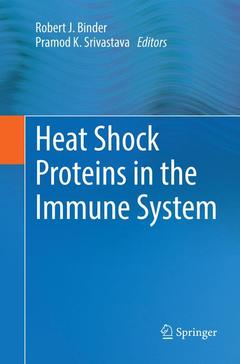Heat Shock Proteins in the Immune System, Softcover reprint of the original 1st ed. 2018
Coordonnateurs : Binder Robert J., Srivastava Pramod K.

Comprehensive resource on the immunobiology of HSPs
One-stop resource on HSPs for both immunologists and cancer researchers
Numerous illustrations aid in clarifying HSPs to both experts and non-experts
Date de parution : 12-2018
Ouvrage de 185 p.
15.5x23.5 cm
Disponible chez l'éditeur (délai d'approvisionnement : 15 jours).
Prix indicatif 163,51 €
Ajouter au panierDate de parution : 04-2018
Ouvrage de 185 p.
15.5x23.5 cm
Disponible chez l'éditeur (délai d'approvisionnement : 15 jours).
Prix indicatif 163,51 €
Ajouter au panier


